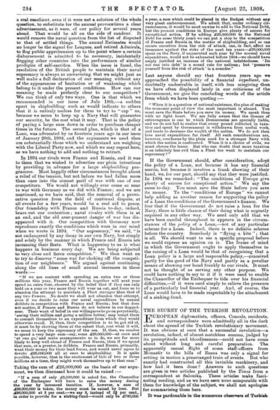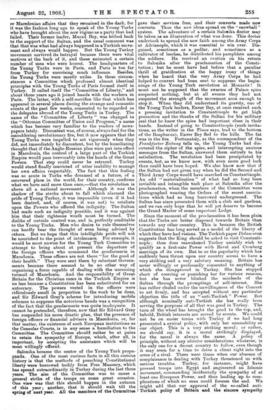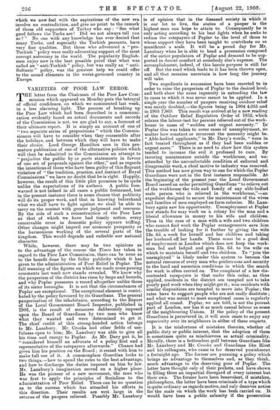THE SECRET OF THE TURKISH REVOLUTION.
EUROPEAN diplomatists, officers, Consuls, residents, and correspondents were admittedly all in the dark about the spread of the Turkish revolutionary movement. It was obvious at once that a successful revolution—a revolution, indeed, of almost matchless success, judged by its promptitude and bloodlessness—could not have come about without long and careful preparation. The apparently casual flight of some staff-officers from Monastir to the hills of Resna was only a signal for setting in motion a prearranged train of events. But who exactly had constructed all this invisible machinery, and how had . it been done ? Answers to such questions are given in two articles published by the Times from a correspondent at Salonika.. These articles make fasci- nating reading, and as we have seen none comparable with them for knowledge of the subject, we shall not apologise for summarising them here.
It 'was pardonable in the numerous observers of Turkish or Macedonian affairs that they remained in the dark, for it was the fashion long ago to speak of the Young Turks who have brought about the new regime as a party that had failed. Their former leader, Murad Bey, was bribed back to the support of the Sultan, and the usual comment was that that was what had always happened in a Turkish move- ment and always would happen. But the Young Turkey movement survived its betrayal because there were vital motives at the back of it, and these animated a certain number of men who were honest. The headquarters of the Young Turks were in Paris, and Paris is too far from Turkey for exercising much influence. Besides, the Young Turks were mostly exiles. In these circum- stances a Committee which professed almost identical principles with the Young Turks of Paris formed itself in Turkey. It called itself the " Committee of Liberty," and about three years ago it joined bands with the workers in Paris. The latter, with a self-sacrifice like that which has appeared in several places during the strange and romantic events of the past few weeks, consented to be regarded as the delegates abroad of the Young Turks in Turkey. The name of the "Committee of Liberty" was changed to the " Ottoman Committee of Union and Progress," a name which has become very familiar to the readers of news- papers lately. Discontent was, of course, always fuel for the smouldering revolutionary fire, but it now appears that the Young Turks were impelled to act vigorously when they did, not immediately by discontent, but by the humiliating thought that if the Anglo-Russian plan were put into effect in Macedonia, the control of a large part of the Turkish Empire would pass irrevocably into the hands of the Great Powers. That step could never be retraced. Turkey would stand finally convicted of utter inability to manage her own affairs respectably. The fact that this feeling was so acute in Turks who dreamed of a future, of a recovered place in the world, for their country, confirms what we have said more than once,—that the revolution is above all a national movement. Although it was the shadow of the stroke about to fall which alarmed the pride of Young Turkey, it was impossible (even if it had been desired, and, of course, it was not) to retaliate upon the Powers who offered the indignity. The Sultan had made such an indignity possible, and it was against him that their righteous wrath must be turned. The dislike of outside control was, and is, perfectly creditable to the Young Turks. Men who desire to rule themselves can hardly bear the thought of even being advised by others. But we hope that this intelligible pride will not be nourished to the point of intolerance. For example, it would be most unwise for the Young Turk Committee to attempt to bring about at present the departure of the foreign officers who command the gendarmerie in Macedonia. These officers are not there " for the good of their health." They were sent there by reluctant Govern- ments because there seemed to be no other way of organising a force capable of dealing with the unceasing turmoil of Macedonia. And the responsibility of Great Britain for the Christian races in the Turkish Empire is no less because a Constitution has been substituted for an autocracy. The powers vested in the officers were ridiculously small in proportion to the work to be done, and Sir Edward Grey's scheme for introducing mobile columns to suppress the notorious bands was a recognition of the fact that the gendarmerie was quite inadequate. It cannot be pretended, therefore, now that Sir Edward Grey has suspended his more drastic plan, that the presence of foreign officers or financial advisers in Macedonia, or, for that matter, the existence of such European institutions as the Consular Courts, is in any sense a humiliation to the Committee. The Committee should rather be at pains to retain the sympathy of Europe, which, after all, is important, by accepting the assistance which will be most willingly offered.
Salonika became the centre of the Young Turk propa- ganda. One of the most curious facts in all this curious history is that the methods of preaching Constitutional liberty •were borrowed bodily from Free Masonry, which has spread extraordinarily in Turkey during the last three years. The aim of the Committee was to cause a general strike of the troops on some great occasion. One view was that this should happen in the autumn of this year ; another, that it should wait till the spring of next year, All the members of the Committee gave their services free, and their converts made new converts. Thus the new ideas spread on the " snowball " system. The adventure of a certain Salonika doctor may be taken as an illustration of what was done. This doctor undertook to spread the new faith among the Army Corps at Adrianople, which it was essential to win over. Dis- guised, sometimes as• a pedlar, and sometimes as a cultivator of leeches, he distributed his pamphlets among the soldiers. He received an ovation on his return to Salonika after the proclamation of the Consti- tution; but he must have had before that a peculiar thrill of gratification at the happy irony of things when he heard that the very Army Corps he had helped to convert had been sent to suppress the begin- nings of the Young Turk revolution at Monastir ! It must not be supposed that the swarms of Palace spies suspected nothing, but at all events they had not suspected the strength of the movement soon enough to stop it. When they did understand its gravity, one of the Young Turk leaders, Enver Bey, at once received such a pressing invitation to Constantinople to get high promotion and the thanks of the Sultan for his military zeal that he knew the spies had important clues in their hands. Instead of going to Constantinople (such invita- tions, as the writer in the Times says, lead to the bottom of the Bosphorus), Enver Bey fled to the hills. The fat was in the fire. Fortunately, as the correspondent of the Frankfurter Zeitung tells us, the Young Turks had dis- covered the cipher of the spies, and intercepting anxious messages from the Sultan, answered them entirely to his satisfaction. The revolution had been precipitated by events, but, as we know now, with even more good luck than could have been hoped. We also know now that if the Sultan had not given way when he did the Second and Third Army Corps would have marched on Constantinople. An odd " materialisation " of what had so long been invisible and intangible took place at Salonika after the proclamation, when the members of the Committee were photographed wearing the Orders of the secret associa- tions which had so long burrowed underground. The Sultan has since presented them with a club and gardens, and we can only hope that he will yet deserve to become the Grand Master of some important Lodge.
Since the moment of the proclamation it has been plain that the Turks are better disposed towards Britain than towards any other country. This is because the British Constitution has long served as a model of the liberty of which they have had visions. The Turkish paper Ikdam even suggests that the King should be asked to visit Constanti- nople ; thus does reawakened Turkey amiably wish to qualify as a first-rate Power with Royal and Cronberg meetings of its own. But to us the popularity which has suddenly been thrust upon our country seems to have a very striking and a very salutary meaning. Britain has never willingly or professedly consented to anything of which she disapproved in Turkey. She has stopped short of coercing or punishing her for various reasons, but she has never blinked the misdeeds of the Sultan through the promptings of self-interest. She has rather chafed under the unwillingness of the Concert to act firmly, and has accepted without any particular, objection the title of an " anti-Turkish " Power. But although nominally anti-Turkish she has really been serving the purposes of all that was good in Turkey. The turn of the wheel has brought the good to the top, and; behold, British interests are served by events. We could not be on easier terms with Turkey if we had long prosecuted a cynical policy, with only her amenability as our object. This is a very striking moral; or rather, we should say, it is a moral strikingly displayed, for the moral is always the same. A policy of principle, without any ulterior considerations whatever, is the only one for a decent country to follow, even though it may seem for a time to drive a client right into the arms of a rival. There were times when our absence of complaisance in dealing with Turkey threatened us • with serious troubles. Turkey, for instance, might have pressed troops into Egypt and engineered an Islamic movement, commanding incidentally the sympathy of at least one European Power, and thus leading up to com- plications of which no man could foresee the end. We might add that our approval of the so-called anti- Turkish policy of Britain and the sincere sympathy which we now feel with the aspirations of the new era involve no contradiction, and give no point to the remark of those old supporters of Turkey who say : " See what good fellows the Turks are ! Did we not always tell you so ? " No one with any knowledge has ever denied that many Turks, and especially the Turkish peasants, have very fine qualities. But those who advocated a " pro- Turkish " policy were really advocating support of the most corrupt autocracy in the world. The popularity English- men enjoy now is the best possible proof that what was called an " anti-Turkish " policy, but was really an " anti- Sultanic " policy, was the greatest help we could offer to the sound elements in the worst-governed country in Europe.




































 Previous page
Previous page